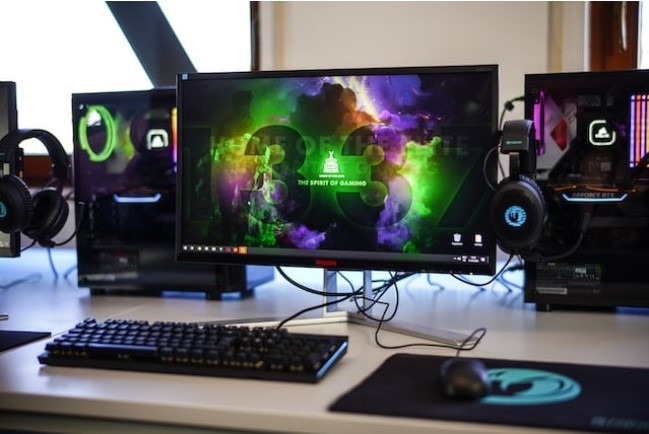
When you are streaming your gameplay, your gaming headset plays a very important role and helps you get a good experience.
No one likes a muffled sound, neither you, your teammates, or your viewers.
So, whether you’re a seasoned pro or just starting, having the right gear is crucial for a seamless streaming experience.
In this blog post, I’ll explain the important features, like microphones that cancel out background noise and sound that make your viewers feel like they’re in the game.
I’ll also share secrets for getting the best audio settings. This blog post will help you find the perfect gaming headset to make your stream sound amazing.
So, let’s dive in.
Step 1: Know Your Budget

Okay, let’s start with the money talk. I know it’s not the most exciting point, but it’s crucial.
Before you dive into the headset world, set a budget.
Ask yourself, “How much am I willing to spend?” It’s like shopping for anything else.
Think about how serious you are about streaming and gaming. You might not need to invest in a top-of-the-line headset if it’s a casual hobby.
On the other hand, if streaming is your passion or even your career, it makes sense to allocate a more substantial budget.
It’s important to find a perfect balance between your money and the value offered by your gaming headset without any compromises.
Step 2: Wired or Wireless?

The next crucial decision is whether you want wired or wireless gaming headsets.
Let’s break down the pros and cons of each:
Wired headsets:
Pros:
- Generally, lower latency, which is crucial for gaming.
- No need to worry about battery life.
- Often more affordable than wireless options.
Cons:
- Limited mobility due to the cable.
- Wires can get tangled if not managed properly.
Wireless headsets:
Pros:
- Freedom of movement without cables.
- It is great for streaming setups where you move around.
- Less clutter on your desk.
Cons:
- Slight latency (delay) compared to wired headsets.
- Need to recharge or replace batteries.
Consider your gaming and streaming setup when making this choice.
If you’re stationary and prefer the best audio quality, wired headsets might be your best choice.
If you like to move around during your streams or want a cleaner setup, wireless headsets are worth considering.
Step 3: Comfort Is Key

While streaming, you might be wearing your gaming headsets for hours.
Hence, comfort should be a top priority.
Look for headsets with:
- Cushioned ear cups: These provide comfort and help with noise isolation.
- Adjustable headbands: Ensures a secure fit on your head.
- Breathable materials: Prevents discomfort caused by heat and sweating.
When possible, try headsets on before buying, or read reviews to get a sense of their comfort level.
Everyone’s head and ears are different, so what’s comfortable for one person may not be for another.
Step 4: Audio Quality

Now, let’s talk about audio quality.
You don’t need to be an audiophile to make the right choice when it comes to gaming headsets.
Here are some simple guidelines:
- Stereo vs. Surround Sound:
Most gaming headsets offer stereo sound, which is fine for gamers and streamers.
Surround sound can be nice for a more immersive gaming experience, but it isn’t necessary. - Frequency Response:
Look for headsets with a broad frequency response range. This helps you hear a wide range of sounds, from deep bass to high treble. - Impedance:
Lower-impedance headsets are easier to drive and are compatible with a wider range of devices, including gaming consoles and smartphones.
Remember, the goal is to have clear and immersive audio for gaming and streaming.
You don’t need to understand all the technical details; just look for headsets with good overall reviews for audio quality.
Step 5: Microphone Quality

A good microphone is just as important for streaming as the headsets themselves.
Luckily, many gaming headsets come with built-in microphones.
When evaluating microphone quality, consider the following:
- Noise cancellation: Look for headsets with noise-canceling microphones to minimize background noise.
- Clarity: Ensure the microphone captures your voice clearly without distortion or static.
- Position: Adjustable microphones help position the mic where it’s most comfortable.
Test the microphone if possible or read reviews to gauge its quality.
Remember, your audience wants to hear you clearly, so don’t compromise on microphone quality.
Step 6: Compatibility

Before making a final decision, double-check the compatibility of your chosen gaming headsets with your gaming platform.
Most gaming headsets are designed to work with PCs, but if you’re a console gamer (Xbox, PlayStation, etc.) or use other devices like a smartphone or tablet, make sure the headsets you choose are compatible.
Step 7: Reviews and Recommendations

When in doubt, ask your gaming buddies or fellow streamers for advice. Read reviews online, check out forums, and even scroll through social media.
You’ll find valuable insights from fellow gamers and streamers who have tested various headsets.
Also, don’t hesitate to ask friends or fellow streamers for recommendations.
Personal experiences and recommendations can be beneficial in making your final decision.
Step 8: Bonus Features

Lastly, let’s talk bonus features because who doesn’t like a little extra something?
- RGB Lighting: If you’re into aesthetics, some gaming headsets come with customizable RGB lighting options.
- Customizable Sound Profiles: Certain headsets allow you to tweak the audio.
While these features aren’t essential, they can add a touch of personalization and style to your gaming and streaming setup.
Conclusion:
So, here we are, adventurers in the world of gaming headsets.
Choosing the best headsets for your streaming journey doesn’t need to be rocket science.
Remember your budget, consider comfort, sound, and microphone quality, check compatibility, check reviews, and don’t forget the bonus features if you feel fancy.
The right gaming headsets can make a world of difference in your streaming experience.
They’ll make you feel like you’re in the game, and your audience will thank you.
So pick your perfect pair, and let the gaming and streaming adventures begin! Happy gaming, everyone! 🎮🎧🚀
Frequently Asked Questions
Do I need a separate microphone for streaming if my headset has one?
Not necessarily! Most built-in headset mics are decent, but for clearer, crisper audio, especially with background noise, a dedicated microphone is ideal.
How important is surround sound for streaming?
It depends on your preference and content. While immersive for gameplay, stereo sound generally suffices for streaming and is more budget-friendly.
What’s the ideal frequency response range for a gaming headset?
Aim for a wider range (20Hz-20kHz) to capture deep bass and sharp highs for rich audio experience.
Can I use a mobile gaming headset for streaming on PC?
Maybe! Check compatibility carefully. Some mobile headsets work with PCs, but dedicated PC headsets offer better features and audio quality.
Can glasses wearers comfortably use gaming headsets for long periods?
Depends on the headset design! Look for models with comfortable ear cups and adjustable headbands to avoid pressure on glass frames.
Do open-back or closed-back headsets provide better audio for streaming?
Closed-back offers better noise isolation for focused streaming, while open-back delivers wider soundstage for immersive gameplay. Choose based on your needs.
Can I use voice changer software with my gaming headset mic?
Yes, many popular voice changer apps work with most headset mics, letting you add fun effects to your voice during streams.
Also Read….
- Why Are Gaming Headsets So Big? [13 Reasons]
- Are Gaming Headphones Good for Calls [2024]
- How Do Gaming Headsets Work? [2024]
- What to Look for in a Gaming Headset [Buying Guide 2024]
- How To Set Up Gaming Headphones Like a Pro
- Virtual Surround Sound In Gaming Headphones Explained
- Gaming Headsets Vs Regular Headsets: Which Should You Choose?
- How To Improve Audio Quality on Gaming Headset [2024]
- How To Fix Common Problems With Gaming Headphones
- How to Clean and Maintain Your Gaming Headset [2024]
Hi, I’m Vishal, founder of Gaming Bar, your ultimate hub for gaming and tech gear. I am passionate and dedicated to improving your gaming experience and providing honest reviews about gaming and tech products. You’ll find plenty of honest, unbiased reviews, buying guides, and expert opinions presented in an engaging manner. All I ask is that you share my blog posts and support me.
